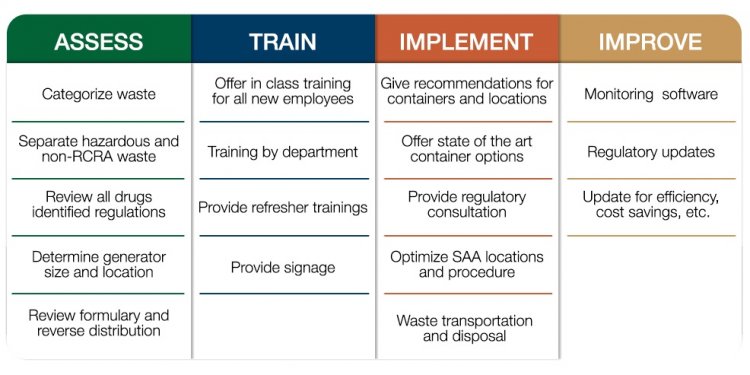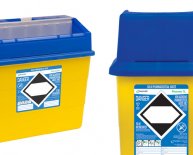
Pharmaceutical Waste Disposal
Related links Additional resources Contact information For more information on household healthcare waste, contact: 608-266-2111
Find out how, where and why to dispose of pharmaceutical waste properly in Wisconsin. Do not flush drugs down the toilet or a drain. Follow the recommendations below.
Waste pharmaceuticals include a wide variety of items, such as over-the-counter and prescription medications, controlled substances and sharps. These wastes come in the form of solid pills and capsules, creams, liquids and aerosols. Guidelines for properly managing these wastes differ depending on where the waste is created, handled and disposed.
The DNR recommends that household pharmaceuticals, including pet medications, be managed as follows.
REDUCE pharmaceutical waste whenever possible
- Buy only as much medication as you can reasonably use before its expiration date.
- When your doctor prescribes a new medication, ask the doctor to prescribe only enough to see if the medication will work for you and in the lowest dose advisable. That way, if the medication doesn't suit you, less would go to waste.
- Reconsider the use of products that claim to be antimicrobial or antibacterial. Plain soap and water is as effective as antibacterial soaps. The Centers for Disease Control recommends plain soap in its hand washing procedure.
REUSE/RECYCLE drugs when possible
Wisconsin allows certain pharmacies to take back unit doses of drugs for cancer and chronic diseases. Certain drugs can be returned for re-issuance through the Wisconsin Drug Repository [exit DNR].
There are very few cases in which other drugs can be donated. This applies to overseas efforts as well. If you see an opportunity to do this, approach with caution and research the program well.
DISPOSE of the remainder properly
If you have prescription medications containing narcotics or other controlled substances, contact your local police department to find out if the police will accept them. Some police departments accept non-controlled substances too, but you should find out exactly what yours will accept before dropping off the items.
When a loved one has died, arrange for proper destruction of the person's medications as soon as possible. A family member or the person responsible for the person's estate can now take the medications to a collection program or mail them to a destruction facility. U.S. Drug Enforcement Administration rules no longer allow hospice and home care staff to manage controlled substances on behalf of their deceased patients.
Use pharmaceutical drop-off sites and collection events
Whenever possible, take your unused pharmaceuticals to a collection program or event. Before going to the collection site, ask whether to bring medications in their original containers or mixed together in a small, securely sealed plastic bag. Do not bring needles and other sharp items, inhalers, chemotherapy drugs or mercury items (e.g., thermometers) to a medication collection. These items cannot be incinerated along with other medications.
If a drug collection program does not exist in your area, encourage your healthcare provider, local governments and local law enforcement agencies to develop one.
Use mail-back programs
The DEA also now allows mail-back programs for unused household medications. Ask your local pharmacy, police department or healthcare provider if they have mail-back packages for you to use or buy. Be alert for fraudulent mail-back schemes. Legitimate mail-back packages must have pre-paid postage, unique identification numbers and be pre-addressed to a location authorized by the DEA for destroying unused medications. And, when possible, avoid leaving mail-back packages in unsecured rural mailboxes.
Use caution if storing medications
When storing unused pharmaceuticals before taking or sending them to a collection point, minimize the risk of accidental poisoning, overdose or diversion (illegal use by someone other than the intended person) by storing medications out of reach of children or in a locked cabinet.
Ensure safe disposal
If you have no other options, do not flush and do not burn your unused pharmaceuticals. Instead, dispose of them in the trash. Especially when there is a risk of accidental poisoning, overdose or diversion, it is better to dispose of household pharmaceuticals than to hang onto them. When placing unused pharmaceuticals in the trash:
- You may remove or mark over all labels that identify the materials as pharmaceuticals or that could provide personal information about you, including prescription information that someone could try to refill.
- You may render them unattractive to children and thieves by dissolving them in a small amount of water or alcohol, or by grinding them up and mixing them with coffee grounds or kitty litter.
- Put them in a second container or small, opaque plastic bag and hide them in your trash.
Never burn pharmaceuticals or personal care products in a burn barrel. Uncontrolled burning can create dioxins and other air pollutants.
Beware of medicine disposal products
Manufacturers are offering various “medicine disposal products” and claiming the products will render drugs safe for disposal. The DEA, U.S. Environmental Protection Agency, U.S. Food and Drug Administration, and other federal agencies have not reviewed or approved any medicine disposal products and do not have any performance standards or guidelines specially for such products. Federal agencies and the Wisconsin DNR recommend using secure medicine take-back programs as the best disposal option and using trash disposal is a last resort, as described above.
Manage sharps separately
Do not put sharps in the trash! Syringes, lancets and other sharp medical items should be managed separately.
Manage chemotherapy waste carefully
Chemotherapy drugs may affect others living in your home while your body is getting rid of the drugs. Disposable items (such as gloves, adult diapers and sanitary pads) should be sealed in two plastic bags and put in the regular trash. Reusable items (such as clothes and linens that have body fluids on them) may be laundered in a washing machine but should be laundered separately from other clothes. Before washing, store these items in a plastic bag.
The American Cancer Society offers practical precautions for people who recovering at home after receiving chemotherapy treatments. Scroll down to “How can I protect myself and those I live with while I’m getting chemo?”
green iguana maggie green green dot phone number jordan 6 electric green jade green green houses green felt solitaire iphone 11 green sauteed green beans green hills green sea turtle tf green airport sea foam green green olive the green hornet chloe green red green colorblind green crack dark green dress green card status true green green shoes baby's poop is green green river utah putting green green shades green white red flag green bay packers roster sea green green heels green river college green mucus green bay packers rumors green color palette village green apartments green revolution village green sage green nails recipe for fried green tomatoes neon green aesthetic green pepper green jordan 1 free cell green felt jo green green chili green yellow red flag the green room green day tour how to cook fresh green beans green bean green snake green tea shots green tea shot recipe olive green dress green bay packers logo green potatoes green tea caffeine the green dark green hair green baby poop green tree frog green sheets al green let's stay together what does it mean if your poop is green bright green poop green smoothie blue green eyes al green songs green aventurine meaning bowling green kentucky behind the green door green berets green hair dye














